Most modern commentaries on the parable of the Prodigal Son explain that the detail of the father running to greet his wayward boy is important. I suspect it was the brilliant Middle Eastern scholar, the late Kenneth Bailey, who introduced this detail; I vividly recall hearing Ken describe the slow, regal walk of certain Middle Eastern men. To walk in haste (let alone run) was a great indignity. Slow is beautiful.
Some of the brilliant books I want to tell you about today deal directly with questions of hurry, of haste, of our understanding and use of time, of the dangers of busy-ness. The others mention the quandary of living gentle and wisely in this hot-wired, fast-paced culture so even if they are not about time, they are perfect selections for this BookNotes list and utterly germane. I’ve read all four of these beautiful, good books and invite you to read my essay about them.
As usual, we have these on sale for our BookNotes readers and you can easily order them by clicking on the order link at the end of this column. It’s easy and secure.
Allow me to ease into this issue of BookNotes by inviting you to read these books conscientiously and perhaps a bit slowly. At least three of these demand an intentionally slower pace. The first – ironically, the one that deals most directly with the sickness and dangers of hurry – can be read quickly as it is written in a light, clever way that keeps you turning pages easily. But don’t be fooled, breezy as The Ruthless Elimination of Hurry may be, it is serious and profound. As you will see, I very, very highly recommend it.
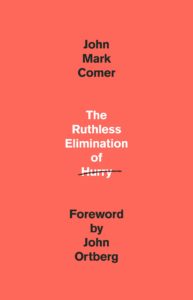 The Ruthless Elimination of Hurry by John Mark Comer (Waterbrook) $23.99 OUR SALE PRICE = $19.19
The Ruthless Elimination of Hurry by John Mark Comer (Waterbrook) $23.99 OUR SALE PRICE = $19.19
In “So Far So Fast”, one of the stand-out songs on I Am Easy To Find, the brilliant, recent album by The National, the driving, building, rhythm keeps the song moving but the slow vocals are anguishing. Parts of the song almost make me cry, it aches so. They sing “There’s so much that drives me crazy,” but then confesses how it helps to “talk to you.” And then the plaintive: “can you get away to talk to me?” That is, can you find the time?
In my more melancholy moods I hear myself as the singer — lonely, needy, wanting to connect with somebody who cares. But, truth be told, it’s usually the other way around. I’ve got plenty of people who (for whatever reason) want to talk to me.
And, too often, I’ll admit, I feel like the esteemed religious leader in the story of the Good Samaritan who is too busy to stop. Too busy to listen. Too busy to care. Or maybe too exhausted, because I was too busy the week before.
In those moments I realize the damages on a life of viewing going “so far, so fast” as a virtue, or even as normal. After spending quality time with these four remarkable new books I realize that it is not too late to deepen my resolve to pursue – in the famous words of Dallas Willard from which John Mark Comer took the title of his amazing new book – “the ruthless elimination of hurry.”
Comer, by the way, admits (although I would have wished for a bit more emphasis) that hurry is often called for. I don’t know if Willard was just a privileged college prof with tenure who didn’t have to burn the candle at both ends but those of us who have to work two jobs or those whose work is not routine – teaching three days a week – often have little choice about our pace of life. Sometimes slowing down is a luxury some can hardly afford.
Still, the many consequences of the addiction to hurry are well known and we all must grapple with our failures to live within our God-given limitations and our God-ordained rhythms. We are glad that there has been a discovery of ancient practices of Sabbath-keeping and books about rest. We have a large section of books about Sabbath and can recommend some if you want.
(And there are plenty of other books like this new one by Comer. Last month we recommended Rebecca Lyon’s Rhythms of Renewal: Trading Stress and Anxiety for a Life of Peace and Purpose and I think we’ve mentioned the one-of-a-kind, amazing book about youth ministers addressing their young friends about this propensity to overwork called Wrestling with Rest: Inviting Youth to Discover the Gift of Sabbath. Just last week we got the new book by Jefferson Bethke called To Hell with the Hustle: Reclaiming Your Life in an Overworked, Overspent, and Overconnected World. As a preacher of a gospel-centered, grace-filled way of life, I suspect he means this quite literally.)
John Ortberg (who has served as a bit of a mentor to John Mark Comer and wrote a great forward to The Ruthless Elimination of Hurry) has told how when asking Dallas Willard for advice about his spiritual life (while he was serving one of the fastest growing churches in America with much on his plate and a life of pressing demands) and Willard told him to (ruthlessly) cut out his addiction to hurry. Ortberg asked, “What else?” Comer tells it as well as Ortberg, but after a pause, the answer was blunt. There was nothing else.
Beth and I got to hang out once with Dallas before a function. It was years ago, and I didn’t realize at the time that Willard had mentored one of my own heroes, Richard Foster, and encouraged him and prayed him through the writing of The Celebration of Discipline. I viewed Willard as a heady philosopher and apologist, not quite a contemplative, but it became evident that he was, as we say these days, present. He was intrigued about our bookstore, interested in our lives, attentive (when he didn’t have to be.) He was smart but he was also calm and kindly. His thoughtful approach to being apprenticed by Jesus – described so accessibly in Renovation of the Heart and most carefully in Spirit of the Disciplines – shaped him in ways so that everyone who knew him felt cared for. Having read his other books and watched his DVDs and having gotten to know him a bit by perusing the wonderful books about him (Becoming Dallas Willard: The Formation of a Philosopher, Teacher, and Christ Follower by Gary Moon and the anthology of testimonials, Eternal Living: Reflections on Dallas Willard’s Teaching on Faith and Formation and Gary Black’s Preparing for Heaven: What Dallas Willard Taught Me about Living, Dying and Eternal Life I see why so many people esteemed him so.) John Ortberg has been Willard’s chief popularizer, though, and the older friend to John Mark Comer. I can only underscore Comer’s great appreciation of how Ortberg guided him to Willard.
Ortberg quipped that his splendid book The Life You Always Wanted: Spiritual Disciplines for Ordinary People could be called “Dallas for Dummies.” Years later, before Willard’s death a few years ago, IVP released a DVD from a conference with the two of them: Willard would lecture and then Ortberg would follow up in a gee-whiz sort of way and explain “this is what Dallas was trying to say.” (And, conversely, sometimes Ortberg would lecture and Willard would say, “let me tell you more about what John was trying to develop.”) They were quite a team, both excellent communicators, and both in agreement that evangelicals needed the broader church teaching on spiritual disciplines and formation for whole-life discipleship. Each chapter of Ortberg’s wise and wonderful book (and DVD series) Soul Keeping: Caring for the Most Important Part of You starts with a story of a conversation he had with Willard. He notes that that book could just as easily be entitled “everything I learned from Dallas Willard.”
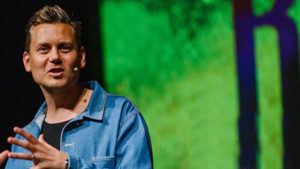 Enter John Mark Comer, hip Portland mega-church preacher and creative writer and energetic speaker. Some of us met him at our Pittsburgh Jubilee conference last year (watch him here) and he lived up to his reputation as a good thinker and good speaker. (Beth and I so appreciate it when speakers actually browse our conference bookstore and we bonded over books as he gave us so much enthusiastic support and encouragement!) Comer is
Enter John Mark Comer, hip Portland mega-church preacher and creative writer and energetic speaker. Some of us met him at our Pittsburgh Jubilee conference last year (watch him here) and he lived up to his reputation as a good thinker and good speaker. (Beth and I so appreciate it when speakers actually browse our conference bookstore and we bonded over books as he gave us so much enthusiastic support and encouragement!) Comer is 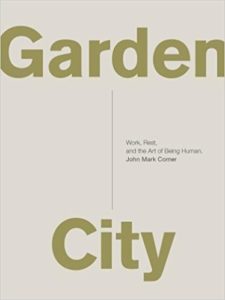 perhaps best known for his book Garden City: Work, Rest, and the Art of Being Human and for a writing style (even a book design) that brings to mind the aesthetics of a young Rob Bell. The books are punchy, with short paragraphs, a few pages of reverse black/white printing, lots of white margin, sleek, simple fonts, no fussy, old-fashioned dust jacket. The minimalist vibe served his young readers well in Loveology and Garden City and God Has a Name and it works very well – in an ironic kind of way – in this new volume about being too fast paced. The Ruthless Elimination of Hurry seems to be written for those in a hurry, which perhaps is as it should be. Not everybody can wade through Willard’s dense and thick Divine Conspiracy. After a busy, draining day I just don’t have it in me to dig into my Merton.
perhaps best known for his book Garden City: Work, Rest, and the Art of Being Human and for a writing style (even a book design) that brings to mind the aesthetics of a young Rob Bell. The books are punchy, with short paragraphs, a few pages of reverse black/white printing, lots of white margin, sleek, simple fonts, no fussy, old-fashioned dust jacket. The minimalist vibe served his young readers well in Loveology and Garden City and God Has a Name and it works very well – in an ironic kind of way – in this new volume about being too fast paced. The Ruthless Elimination of Hurry seems to be written for those in a hurry, which perhaps is as it should be. Not everybody can wade through Willard’s dense and thick Divine Conspiracy. After a busy, draining day I just don’t have it in me to dig into my Merton.
 But let me be clear: cool and hip and funny and snarky as Comer is, he is wise beyond his years, honest about his journey, realistic in his description of our fast paced lives and our personal foibles that to a large degree are formed by our crazy lifestyles. He understands the anxiety many of us feel and he knows it is related to our chronic busy-ness. He talks candidly about being too tired to pray, about binge watching Netflix and crushing Candy Crush. Maybe he worries about drinking too much wine late at night. He knows his youngish Portland congregation, and, I think, knows much about you and me, too. I’ve never once played Candy Crush, but I waste time in my own ways and have huge regrets about the state of my interior life. Ya dig?
But let me be clear: cool and hip and funny and snarky as Comer is, he is wise beyond his years, honest about his journey, realistic in his description of our fast paced lives and our personal foibles that to a large degree are formed by our crazy lifestyles. He understands the anxiety many of us feel and he knows it is related to our chronic busy-ness. He talks candidly about being too tired to pray, about binge watching Netflix and crushing Candy Crush. Maybe he worries about drinking too much wine late at night. He knows his youngish Portland congregation, and, I think, knows much about you and me, too. I’ve never once played Candy Crush, but I waste time in my own ways and have huge regrets about the state of my interior life. Ya dig?
The Ruthless Elimination of Hurry is written in three major parts, and they are all tremendously interesting. It is easy to read as he translates the latest research on our malaise in these digital days and as he describes the draining impact of days of go, go, go, go. He brings an informed understanding without getting bogged down in too many scholarly details.
In the opening pages Comer reveals a bit about his own crisis of near burnout and I was hooked. My hands shook as I turned those first pages. I’m no mega-church CEO or a world-travelling speaker, and I live in a small town and have few aspirations of a living a fancy-pants, big impact lifestyle. But, man, I could relate to the honest angst and real pain suffered by John Mark. Sometimes one’s job and calling and choices propel us on and on and we realize we’re exhausted, stuck on the proverbial treadmill in ways that are anguishing. Said treadmill might be deeply meaningful and entail good, important work. But too much of even a good thing, they say…
And so Comer details his near breaking point, the deep questions of what to do — one can hardly just quit one’s job if it is too stressful, especially if it a job one is called to. But surely, things can be done, changes can be made. There are answers.
And here’s the thing: rather than jumping to the quick fix, resourcing us by guiding us towards sane plans of “ordering your private world” and towards useful tools like Margin (by Richard Swenson) or Greg McKeown’s Essentialism (which Comer does eventually recommend) or even big picture reminders like Richard Foster’s overlooked Freedom of Simplicity or Matthew Sleeth’s 24/6, Comer nicely takes us back to the Willard quote about hurry and, importantly, what lies behind it and beneath it.
Comer knows what Ortberg knows: for Dallas Willard, we eliminate hurry because it is dangerous, bad for our hearts and for our souls, but more, because it is not the Way of Jesus. And this is the key to Comer’s invitation: we are invited to take the easy yoke of Jesus our Rabbi/Teacher and learn his ways. We are to be disciples, after all, which implies that we are apprentices. We don’t just slow down a bit to regain our health, catch our breath. We slow down because it is the way of Jesus and we are to be like Him.
We who are in Christ, part of His church, are to be life-long learners who are shaped in a pattern or lifestyle that is Christ-like, in all aspects of our lives. (That is, not just in “religious” or “spiritual” matters, but about the very ethos and habits and texture of our regular, daily lives.) Yes, there is theological and Biblical content to learn for those following the Jesus way, but more, the way of Jesus is just that – a way of life, not just a system of doctrine. (See The Jesus Way: A Conversation on the Ways That Jesus is the Way by Eugene Peterson for a rich and serious study of this.) And, it is not just a “relationship” as if that’s all we need to say. What is obvious in our marriages, Comer reminds us, should be obvious in our relationship with God: we have to slow down, take time, show up, talk; we must simply be together.)
After the powerful ruminations on how hard contemporary life can be with our speed sickness and habits of haste and then some very interesting and relevant cultural analysis deepening our understanding of our modern mess, Comer shifts to his winsome invitation to solve this problem.
And, so, he preaches on being an apprentice of the Lord Jesus, the nature of a formational faith where we are transformed by living like Jesus lived. In ways I’ve only partially considered Comer reminds us that Jesus was never in a hurry. The gospels report that Jesus spent time in solitude, in silence. He prayed, he partied, he dined, he slept in, he embodied what Japanese theologian Kosuke Koyama calls “the three mile an hour God.”
I often make a big deal that Jesus is God incarnate, that the idea of and reality of the incarnation is essential grist for understanding our own humanness and our human dignity.
(We recommend a small booklet, What Is the Incarnation? by our friend William Evans, for starters, or the classic On the Incarnation by Saint Athanasius, of course. Will Willimon even has a short and fabulous little study simply called Incarnation. And there are plenty of great introductory books on the humanity of Jesus, too, such as Trent Sheppard’s fabulous Jesus Journey or Patrick Reardon’s The Jesus We Missed.)
However, we must – as Comer makes delightfully clear – not just affirm that Jesus was fully human, but we must pattern ourselves after the particular kind of human life he lived.
Follow me, Christ says. For some of us that mostly means the so-called Great Commandment (loving everyone) and for others it tends to mean the Great Commission (preaching the gospel news to everyone). For Comer (as we know from his books and podcasts) it is all that and more. But in this book, it is this: we are to act like Jesus acted, and that means to walk slowly, to breath deeply, to not worry about speed and pressure and performance. To be attentive to others and to carve out time to pray. This spiritual lifestyle is no detached mindfulness in keeping with Buddhist disinterest but is a deeply, vividly alive way to be human in the world. Welcome to the Jesus way of transformation, learned by practicing the slower habits he Himself exhibited. Surely there are these nearly mundane, practical lifestyle implications of our union with Christ, of abiding in Him.
Comer has a really helpful section of four “practices for unhurrying your life.” These are preceded by a great couple of pages (in reverse white on black printing perhaps to signal its significance) called “Wait, what are the spiritual disciplines, again?” Ha. The next unit on the four practices explores silence and solitude, Sabbath, simplicity, and slowing. Whether this is the first time you’ve read about these rather counter-cultural habits or whether you are well-schooled in writers like Ruth Haley Barton and Adele Ahlberg Calhoun, Ronald Rolheiser and Richard Rohr or Donald Whitney and Marj Thompson, this stuff is sweet. It’s upbeat, honest, clear, funny, even. This is a call to think about “A Rule of Life” as you’ve never heard it before.
John Mark Comer is a book lover and I really appreciate how he describes (sometimes with great verve) the books he is citing. The footnotes are a blast. (I’m telling ya, don’t miss reading them!) He’ll tell you why he is quoting a book and then tells you where to start with that author. He even contradicts himself, I think, which makes me grin. (And, like me, in his righteous exuberance, says that is his favorite author or this one is the best and you’ve got to read that one. He likes a lot of books and they are all golden choices. He’s reliable and insightful and motivational, truly enjoying these helpful resources. I sort of like it when he says to just close his book and read, instead, Spirit of the Disciplines or that what he’s trying to say is already said in Emotionally Healthy Spirituality or that Alan Fadling’s The Unhurried Life and The Unhurried Leader says what he’s trying to say, but better. Ho! But he’s not quite right there, as The Ruthless Elimination of Hurry has things that none of those books do (and, did I mention, easier to read and more fun than any of ‘em.)
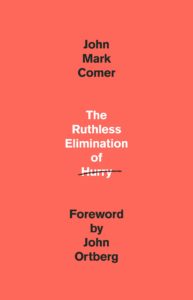 Sure, JMC is not the only one plowing these fields, calling us to reconsider our Christian growth in the ways of Jesus by slowing down and paying attention, and there are others who write more thoroughly. But ya know what? Comer is really, really appealing and he’s really processing this stuff in his own life and he is speaking honestly about it all. He knows the hardships, he knows the temptations, and he’s glimpsed healing hope that things can be more sane. We can have an emotionally healthy spirituality, but it has to be (as we say these days) intentional. And under the (easy) yoke of our leader, Jesus.
Sure, JMC is not the only one plowing these fields, calling us to reconsider our Christian growth in the ways of Jesus by slowing down and paying attention, and there are others who write more thoroughly. But ya know what? Comer is really, really appealing and he’s really processing this stuff in his own life and he is speaking honestly about it all. He knows the hardships, he knows the temptations, and he’s glimpsed healing hope that things can be more sane. We can have an emotionally healthy spirituality, but it has to be (as we say these days) intentional. And under the (easy) yoke of our leader, Jesus.
I think you will enjoy this book. It’s loaded with witty comments that are worth taking to heart. And some simple experiments and playful ideas. For instance, in a section about “unhurrying” he says,
Come to a full stop at stop signs.
None of this California nonsense.
By the way, next time you try this, notice how hard it is. Maybe that’s because I’m from California. But maybe it’s because I feel like I’m not moving fast enough, or even because I’m not enough…there’s that disordered heart, right under the surface of my hurry.
Or, how about this?
Get in the longest checkout line at the grocery store.
Aah, you’re all hating me now! In an efficiency-obsessed culture, why would we do that? That’s literally wasting time on purpose.
Well, here’s why I do it…
I thought he was going to be a “loving resistance fighter” a la the late great Neil Postman and his rousing counter-cultural call in Technopoly. And there’s a little of that, just throwing a wrench in at least our own systems of rush and hurry. But Comer also notes that there is a deeper motivation:
He continues,
It’s wise to regularly deny ourselves getting what we want, with practices as intense as fasting or as minor as picking the longest checkout line. That way, when somebody else denies us from getting what we want, we don’t respond with anger. We’re already acclimated. We don’t have to get our way to be happy. Naturally, this takes a while for most of us. So start small, at aisle three.
So, hurry up and get this book. Read it right away (I’ve only got my tongue half in my cheek.) And then read it again, slowly, ruthlessly. As extreme as that sounds, believe me. We’ve got to give up trying to get so far, so fast.
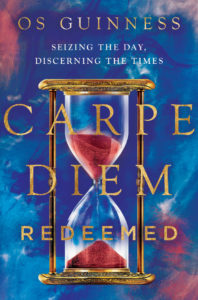 Carpe Diem Redeemed: Seizing the Day, Discerning the Times Os Guinness (IVP) $20.00 OUR SALE PRICE = $16.00 If the new John Mark Comer book, sans dust jacket, is upbeat and breezy in a very cool, conversational style, with goofy asides and postmodern allusions and pop culture references, Dr. Os Guinness’s book (with an old school hour glass on the cover) is rather scholarly, full of historical and sociological allusions – with references to Greek thinkers and Roman historians through Shakespeare quotes and lines from his beloved American Founding Fathers to contemporary academics like Peter Berger or Francis Fukuyama and intellectual leaders such as Rabbi Jonathan Sacks and John Ralston Saul. Comer, in admitting his lack of serious commitment to long distance running jokes about how he’d look in spandex. You aren’t going to hear Os Guinness quip about that.
Carpe Diem Redeemed: Seizing the Day, Discerning the Times Os Guinness (IVP) $20.00 OUR SALE PRICE = $16.00 If the new John Mark Comer book, sans dust jacket, is upbeat and breezy in a very cool, conversational style, with goofy asides and postmodern allusions and pop culture references, Dr. Os Guinness’s book (with an old school hour glass on the cover) is rather scholarly, full of historical and sociological allusions – with references to Greek thinkers and Roman historians through Shakespeare quotes and lines from his beloved American Founding Fathers to contemporary academics like Peter Berger or Francis Fukuyama and intellectual leaders such as Rabbi Jonathan Sacks and John Ralston Saul. Comer, in admitting his lack of serious commitment to long distance running jokes about how he’d look in spandex. You aren’t going to hear Os Guinness quip about that.
Still, he is a man of great joy and I’ve seen him laugh loudly. He is kind to everyone he meets. He has a refreshing hope in His Lord even though he has seen – as he says in this book – two of his brothers starve to death as youth in China. Seventeen million died in the horrendous Japanese invasion of China and he and his missionary family were there. Let that sink in.
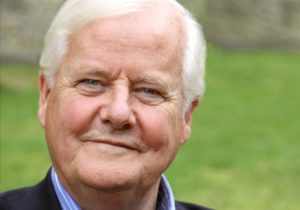
So, when Guinness – an esteemed scholar who has offered his astute observations through dozens of important books about the American condition and the times in which we live – writes about purpose and zeal and meaning, seizing the day, redeeming the time, we should listen, and expect something more than motivational pizzazz to do your thing. He has earned the right to be heard well and deeply considered. Agree always or not, he is, as BookNotes readers surely know, one of my favorite writers and Christian leaders who I count as a friend.
When we announced this book months ago and offered to take pre-orders we summarized it as the publisher had suggested, and it was not untrue: Os himself says this is sequel to his seminal, must-read 1990s title The Call: Finding Meaning and Significance. (It was, as we have heralded, re-issued earlier this year in an anniversary edition with some new chapters.) To “seize the day” does, indeed, seem to sound like a book about living out one’s call, finding one’s vocation and taking off into Kingdom initiatives.
Yet, let me be clear. To take up one’s calling, to live into visions of vocation, to “seize the day”, one has to know what time it is. (That is, by the way, the fifth “worldview question” that New Testament scholar N.T. Wright added to the “four worldview questions” proposed by Brian Walsh & Richard Middleton in Transforming Vision and Truth Is Stranger Than It Used to Be. You may know Wright’s rich discussion of the “five worldview questions” that everyone implicitly answers and lives by in his New Testament and the People of God, the first big volume in his massive “Christian Origins” series.) The question of what time it is – something’s happenin’ in the air, CSNY used to sing — can only be answered, though, when one knows what time is, how it works, why it has been so mysteriously potent in philosophical thinking down through the centuries. In Carpe Diem Redeemed Guinness is not giving us a guide to discerning our careers or a plan to maximize our impact. Nope. He is pondering how we might be timely. Or – you’ll have to read it yourself to fully understand – untimely, as the case may be. In a sense, this book is drawing from his lesser-known, small, potent treatise called Prophetic Untimeliness, which is, in fact, the title of his fifth chapter.
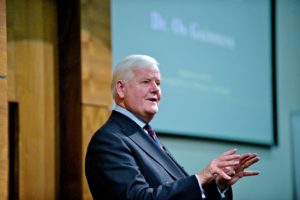 For years Os has been a dynamic public speaker, mesmerizing his audiences as he speaks flawlessly without a note, listing the significance of this, the pressures of that, the obstacles and the opportunities, moving effortlessly through nearly byzantine outlines which gel brilliantly by the hour’s end. His books are no different, offering the joy of logical argumentation, wrapped in the beauty of rhetorical persuasion. I will read anything Os writes for as long as he writes and for as long as I am able.
For years Os has been a dynamic public speaker, mesmerizing his audiences as he speaks flawlessly without a note, listing the significance of this, the pressures of that, the obstacles and the opportunities, moving effortlessly through nearly byzantine outlines which gel brilliantly by the hour’s end. His books are no different, offering the joy of logical argumentation, wrapped in the beauty of rhetorical persuasion. I will read anything Os writes for as long as he writes and for as long as I am able.
He is sometimes a bit stern, it seems. He calls us to be “implacable” in Impossible People which is to say he warns us not to be placated, appeased. We dare not compromise, we must not back down; he exhorts us to be sturdy. Although he writes on civility and eschews talk of culture wars, he knows well the Biblical assumption that we are in for a fight. The Christian faith, the cost of discipleship, is to be lived out through blood, sweat, and tears, and although he preaches about and stands in merciful grace, he has a stout bit of Winston Churchill in him. He doesn’t mess around. He knows what time it is. It’s no wonder he has books that sound an alarm of warning even about our American republic – one is called A Free People’s Suicide and another is Last Call for Liberty.
So, in Carpe Diem Redeemed Guinness offers a bit of criticism of the popular and often shallow pretenses that pass for vocational insight and the “making of meaning” in these secularizing times. He knows we cannot pull ourselves up by our own bootstraps, that we need more than a shot in the arm (or a call to relax.) Both the emotive, bohemian “be yourself” creative voices and the more corporate, business-world advice-miesters about becoming entrepreneurs or captains of industry are both woefully inadequate. We need an approach rooted in more substantive, deeper, sustainable truths. What is this day we are supposed to seize? What’s the point? Is there such a thing as destiny? Can we really discern the times while in our own time? Could a more fruitful perspective be found in the Judeo-Christian view of time as essentially unfolding and meaningful?
To understand and live by this appropriate, wiser view of time, we must guard against what he calls “distorting the past” and “distorting the future.” Offering a Biblically-guided view of generations, he objects to much of the trendy talk about Millennials and Generation Z and Boomers and so forth. It’s a section well worth reading and discussing.
Always a teacher, Os often says that “differences make a difference” and helpfully compares and contrasts different worldviews. One of my favorite books to suggest to serious seekers is his The Long Journey Home which looks at the essential differences between three “families of faith” that have very different views from each other about the nature of things – the Eastern, the secular West, and the Judeo-Christian. In that book, to make the point that what we believe about fundamental things really matters, he compares their respective views of death and dying, grief and hope.) In a brief but essential section of Carpe Diem Redeemed Guinness discusses the differences between the Eastern and secularist views of time (which are very different!) and shows how a reorientation to a Christian view would be a boost to our own sense of dignity and agency, worth and purpose. But, again, this is no cheap sloganeering but a deeply coherent view of purpose in light of a Christian view of history and history-making based on a Biblical view of time itself.
“Thus we can,” it promises on the back cover, “seek to serve God’s purposes for our generation, read the times, and discern our call for this moment in history.”
I am sincerely not trying to balance out a lightweight and a heavyweight book in pairing The Ruthless Elimination of Hurry and Carpe Diem Redeemed. I’m hoping to put for you Comer and Guinness in conversation. (Maybe over a Guinness, but I digress.) Comer is a hoot to read, but remains substantive, important. Mr. Guinness is a different sort of thinker, has a different calling and audience, and brings a rare (but not quite rarified) viewpoint to the big questions about the nature of time and of our times. Carpe Diem Redeemed is a good supplement to Comer’s Elimination of Hurry book. Os Guinness, by the way, has shared the stage with Comer’s big influence, Dallas Willard, and both men respected each other deeply and were friends and colleagues, so while Comer & Guinness are stylistically miles apart they are simpatico. Both books worry about the anxiety produced in a milieu that Guinness dubs “survival of the fastest.” He almost sounds like Comer when he talks about “the tyranny of time.”
As the pop culture and media journalist Steve Turner asks about Carpe Diem Redeemed,
“Most of us feel instinctively that we should seize the day, but is the day worth seizing and should it be grabbed so unreservedly?”
This is a huge question. It is related, I think, to Comer’s invitation to unhurry our lives, to see our apprenticeship to Jesus as the central context for how we live and what we do. Guinness is no quietistic contemplative (and as the head of a big church with multiple sites, Comer is no monk, either.) I suspect both should read Slow Church: Cultivating Community in the Patient Way of Jesus by C. Christopher Smith & John Pattison, a book I think is brilliantly insightful about the gods of efficiency and speed and how they have deformed our faith communities. Still, in Carpe Dime Guinness is asking us to think about one of the most basic things in our lives – time – in light of our knowledge of God and God’s Word. This itself takes time, takes a willingness to be shaped by the liturgies of church and the rhymes of spiritual discipline and to do some serious pondering. It is interesting to me that both Comer and Guinness have been influenced by the legendary Jewish mystic and civil rights activist, Abraham Joshua Heschel, who is perhaps best known for a dense, passionate book on the 8th century Hebrew prophets and the little gem on time, The Sabbath.
As Guinness ponders what it means to “partner with God” and to find “undimmed hope even in the darkest hour” he invites us to “long-term thinking.” (There’s a time-related metaphor for you. And it is one rooted, I might add, in patience, itself a virtue related to our coping with the passing of time.)
Such hope-filled long-term thinking comes from our profound grasp of the Biblical teaching of covenant. Guinness writes,
“For those who live and act within covenantal time, two immensely practical implications flow from this principle.”
You’ll have to read the book yourself to hear more about the implications but they are connected to this notion that we can be long-term in our thinking. (He warns against “the all-at-oncers” or “impatient hotheads” as well as the “never neverers.” Okay, one can’t be elegant in every sentence.) The second implication of a covenantal view of time is that we are “always reliant on God for the final outcome.” He draws a distinction between being responsible but not self-reliant. The end of history is not up to us; “there is a promised time as well as a promised land.”
Only Os Guinness can wisely quote Jane Austen and Soren Kierkegaard in the same sentence:
“Time will explain,” Jane Austen wrote in Persuasion, and Soren Kierkegaard was right that “life can only be understood backwards, but it must be lived forwards.” Only the perspectives of time allow us to distinguish the trivial from the important, the passing from the permanent, and the random from the significant.”
 The book is searching, eloquent and I highly recommend it. The closing afterward in Carpe Diem Redeemed is worth the price of the book, a few beautiful pages I’ve read several times. It closes with the marvelous lyrics to the majestic hymn by Isaac Watts, “O God Our Help in Ages Past.” Inspired by Psalm 90, which poetically reflects on a Godly view of time, it’s a perfect ending to an important, thoughtful book. You’d be wise to take time to read it.
The book is searching, eloquent and I highly recommend it. The closing afterward in Carpe Diem Redeemed is worth the price of the book, a few beautiful pages I’ve read several times. It closes with the marvelous lyrics to the majestic hymn by Isaac Watts, “O God Our Help in Ages Past.” Inspired by Psalm 90, which poetically reflects on a Godly view of time, it’s a perfect ending to an important, thoughtful book. You’d be wise to take time to read it.
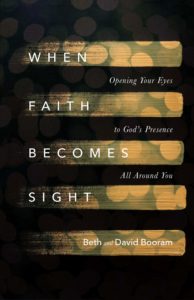 When Faith Becomes Sight: Opening Your Eyes to God’s Presence All Around You Beth & David Booram (IVP/formatio) $17.00 OUR SALE PRICE = $13.60 When a new book on spiritual formation, written by seasoned spiritual directors and retreat leaders comes out, I take notice. However, I will be honest: there is so much being released on spiritual practices and attentiveness to God and the spirituality of the ordinary, and discerning God’s guidance, and so forth that it is hard not to grow almost cynical. What more need to be said? How many more resources do we need in this genre of contemplative spirituality? Curiously, the Booram’s themselves wondered this as well, it seems, and I am delighted they overcame their initial reluctance and released this beautiful, touching, gentle, helpful book. With blurbs on the back from giants like Tilden Edwards and the artfully Celtic Christine Valters Paintner and the amazing Phileena Heuertz and the popular podcasting enneagrammer, Suzanne Stabile, you really need to pay attention.
When Faith Becomes Sight: Opening Your Eyes to God’s Presence All Around You Beth & David Booram (IVP/formatio) $17.00 OUR SALE PRICE = $13.60 When a new book on spiritual formation, written by seasoned spiritual directors and retreat leaders comes out, I take notice. However, I will be honest: there is so much being released on spiritual practices and attentiveness to God and the spirituality of the ordinary, and discerning God’s guidance, and so forth that it is hard not to grow almost cynical. What more need to be said? How many more resources do we need in this genre of contemplative spirituality? Curiously, the Booram’s themselves wondered this as well, it seems, and I am delighted they overcame their initial reluctance and released this beautiful, touching, gentle, helpful book. With blurbs on the back from giants like Tilden Edwards and the artfully Celtic Christine Valters Paintner and the amazing Phileena Heuertz and the popular podcasting enneagrammer, Suzanne Stabile, you really need to pay attention.
And paying attention is much of what When Faith Becomes Sight is about. It really is a guide to nurturing in our deepest habits of our heart of hearts, our mind’s eyes, the ability to see. Is God breaking in to our mundane days? Is the Holy Spirit prompting us, wooing us, pushing us? Are we taking notice? Perhaps we are just too tired to care. Or too distracted.
Distraction. That has been a theme of the upbeat John Mark Comer book, even though he (in his hip, whimsical way) speaks hard truth about the urgency of changing our deadly habits the cause us to give in to superficial distractions. Os Guinness, in his more academic and sociological voice, is inviting us to be attentive to God and God’s ways (not the shimmering ways of the world or false dreams of being superficially relevant and timely) and thereby see more faithfully. But this lovely new book is directly about recognizing God’s presence, about learning what to look for and how to look for it. Urban activist Juanita Rasmus called When Faith Becomes Sight “the equivalent of spiritual LASIK, offering improved vision.” Exactly.
 I was drawn into the adventure of this book by its very structure. It is nicely written and wonderfully organized. There are a handful of chapters that comprise each section. Part One is called “Looking For” and is about “recognizing the signs of God.” With discussions of transcendent moments and “slender threads” and a chapter called “The Fertile Void” I was very impressed. I hope we are never too busy to look for God’s presence, but, well, we all know better.
I was drawn into the adventure of this book by its very structure. It is nicely written and wonderfully organized. There are a handful of chapters that comprise each section. Part One is called “Looking For” and is about “recognizing the signs of God.” With discussions of transcendent moments and “slender threads” and a chapter called “The Fertile Void” I was very impressed. I hope we are never too busy to look for God’s presence, but, well, we all know better.
Part Two is called “Looking Through” which is about discovering what they call “our unconscious and conscious lenses.” I’m still pondering some of this but it is rich and thoughtful, without being too deep. With chapters like “expectations and assumptions” and “The Holy Flame” it really does invite us to God, to Jesus, even to the Holy Book itself. What good stuff.
The third part is called “Looking Within: Entering the Deep Waters of Your Soul.” I was glad it started with “(Dis)Orientation” (a nod to Brueggemann, I suppose) and a chapter called “Befriending Desire.” I’ve not yet finished the chapter “Night Work” in part because it evokes much and I have to sit with a bit more. There is a lot here. It is a book to read slowly.
This journey to actually experience “when faith becomes site” presumes we have time and calm to be attentive to this work. With or without a spiritual director or soul friend, or even without a healthy tool like this guidebook, we still, sooner or later, have to come to grips with our schedules, our time, our hours and how we fill them. We have to be comfortable with “unhurrying” and even entering periods of sustained silence. We have to slow down and take time to reflect. I myself skipped over the reflection questions mostly because I wanted to get done and move on. To my detriment, I can get “so far so fast.” Sigh.
 “God is on the lookout for you,” they say. I trust that that is true. So, curiously, even in the midst of a busy, busy life, thanks to God’s own initiatives, we can learn to practice the presence of God and be able to see what might be true moments of transcendence. We can discern God’s role in our own lives. We must slow down and be attentive, and When Faith Becomes Sight, by trustworthy guides, can help.
“God is on the lookout for you,” they say. I trust that that is true. So, curiously, even in the midst of a busy, busy life, thanks to God’s own initiatives, we can learn to practice the presence of God and be able to see what might be true moments of transcendence. We can discern God’s role in our own lives. We must slow down and be attentive, and When Faith Becomes Sight, by trustworthy guides, can help.
Helpfully, the Boorams’ good book includes a special appendix that offers a page or two about the role of experience. Beth Booram co-wrote a fabulous IVP book with J. Brent Bill about using your senses to be awakened to God’s presence (and even another, Starting Something New, which told her own story of hearing and following her calling) so they know something about this. I’m not at all kidding -that small piece, too, is well worth taking the time to ponder deeply and discuss with friends. This is a book that is a joy to read but will best be absorbed slowly, with others, even.
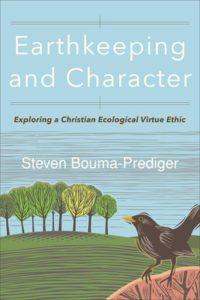 Earthkeeping and Character: Exploring a Christian Ecological Virtue Ethic Steven Bouma-Prediger (Baker Academic) $24.99 OUR SALE PRICE = $19.99 Have you ever hugged a book? I mean, right in the middle of it you are just so grateful, so glad, so appreciative that you just hold its pages to your chest and smile and whisper a prayer of thanksgiving?
Earthkeeping and Character: Exploring a Christian Ecological Virtue Ethic Steven Bouma-Prediger (Baker Academic) $24.99 OUR SALE PRICE = $19.99 Have you ever hugged a book? I mean, right in the middle of it you are just so grateful, so glad, so appreciative that you just hold its pages to your chest and smile and whisper a prayer of thanksgiving?
If not, I hope you don’t think I’m too weird, but I did this with the new release by Professor Bouma-Prediger. It’s hard to explain why I am overcome with joy for this title but I suspect it is partially because I’m so glad for a book that is truly pioneering – making a reader feel like he or she is in on something vital and groundbreaking and redemptively new; the Lord doing that new thing promised in Isaiah 43 perhaps? It is also my gladness for seeing a scholar that writes so well, a good storyteller who knows his philosophy, a professor that is as keen on telling about kayaking technique or his love for the Northern Lights as he is on the history of the sacred-secular dualism in Western rationalism or the scholarship behind certain schools of theological thought. Further, I am nearly verklempt whenever I see a seriously Reformed Calvinist who is fluent in Catholic theology and spirituality and when I see an evangelically-oriented Bible scholar who cites so widely across the theological spectrum (in this case, from Lutheran Joseph Sittler and German Reformed Jurgen Moltmann.) He so deftly weaves into his scholarship gracious moments by citing the likes of poetry by Wendell Berry and Mary Oliver and profound excerpts of Nicholas Wolterstorff and Sylvia Keesmaat and Tom Wright. I believe this book’s content and teaching is exceptionally important and I commend it urgently; aside from its significance, I recommend it for how it is a model of generous, interesting, relevant, elegant scholarship.
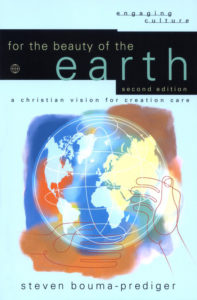 I have read Steven’s excellent book on creation care For the Beauty of the Earth and the extraordinary co-authored volume (with Brian Walsh) called Beyond Homelessness: Christian Faith in a Culture of Displacement. (We even stock his deep Oxford University Press book The Greening of Theology where he compares the ecological models of Rosemary Ruether, Joseph Stiller and Jurgen Moltmann.) He is a scholar who you should know and has done books you should read. Listen to A.J. Swoboda, author of Subversive Sabbath:
I have read Steven’s excellent book on creation care For the Beauty of the Earth and the extraordinary co-authored volume (with Brian Walsh) called Beyond Homelessness: Christian Faith in a Culture of Displacement. (We even stock his deep Oxford University Press book The Greening of Theology where he compares the ecological models of Rosemary Ruether, Joseph Stiller and Jurgen Moltmann.) He is a scholar who you should know and has done books you should read. Listen to A.J. Swoboda, author of Subversive Sabbath:
“Bouma-Prediger’s groundbreaking For the Beauty of the Earth woke me up to Christ’s call to care for the earth. One might struggle to imagine how he could top that prophetic book. He has done it. This book will change the way we think about discipleship. And it will change the way we think about how a discipled people can transform the world.”
Listen to Jonathan Moo, environmental science prof at Whitworth University, (who co-authored the splendid Creation Care: A Biblical Theology of the Natural World with his father, the famous New Testament scholar, Douglas Moo) who says:
“This book cements Bouma-Prediger’s reputation as one of our best thinkers and writers on the most important issue facing Christians today: how we relate to God’s creation and care for it well in a time of profound crisis. This important book will now be required reading in my environmental ethics courses.”
You should realize that this book really is covering a topic that is unlike any other accessible Christian creation-care book we know: it is, as it says, about character, about virtue ethics.
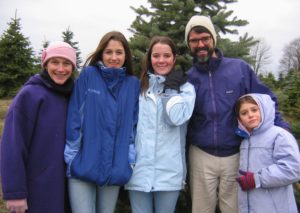 In a moving story in the beginning Steven and some students are hiking and as they come to their wilderness campground, the find the place nearly trashed — litter scattered, burnt logs and ashes scattered, bark stripped from the glorious white birches. “Who kind of a person would do a thing like this?” a student cries? (And, conversely, he revisits the story and comes across a wonderfully well-kept spot, protected, nurtured, stewarded. And the question remains: “What kind of people do something like this??
In a moving story in the beginning Steven and some students are hiking and as they come to their wilderness campground, the find the place nearly trashed — litter scattered, burnt logs and ashes scattered, bark stripped from the glorious white birches. “Who kind of a person would do a thing like this?” a student cries? (And, conversely, he revisits the story and comes across a wonderfully well-kept spot, protected, nurtured, stewarded. And the question remains: “What kind of people do something like this??
And so, we start a journey that I found very helpful and – as many have said in recent decades – is exceptionally important; namely, a study of virtue ethics. That is, we need more than the standard sort of right vs. wrong mentality that asks us to do the right thing out of duty, obedience, a proper response to the rules. Rather, some have said (perhaps you’ve heard of Aristotle, or, in our day, Alistair McIntyre and Stanley Hauerwas) that a more helpful and fruitful and lasting kind of ethics isn’t just merely our duty to do right, but the question of being a good person; that is, a virtuous person who wants to do the wise and good thing. It ends up, there is a large difference between a person who is dutiful to obey the rules, to do good, and a person who desires to be good.
(Some Hearts & Minds friends heard Karen Swallow Prior introduce us to this when she visited here and described the first chapter in her splendid On Reading Well: Finding the Good Life Through Great Books and many more have read it. I myself sometimes recommend the wonderful rumination on all this by Dennis Hollinger in his book Choosing the Good: Christian Ethics in a Complex World. And of course, there’s the lovely, late Lewis Smedes and his very practical, down-to-Earth reflection called Choices: Making Right Decisions in a Complex World. Perhaps an author who has helped us all at least start thinking about this, even though he isn’t an ethicist as such, is James K.A. Smith whose You Are What You Love is a supremely excellent study of character formation, how stories shape our imaginations that in turn call us to live out a certain sort of vision of the good life. We live our of our hearts desires, he explains, which is shaped by some assumption and longing for and construal of the good. It’s a great introduction to the discussions of virtue and character and how we live.)
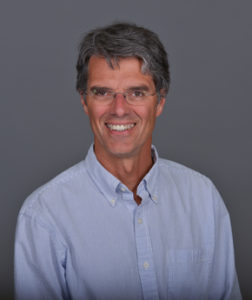 Bouma-Prediger is a great teacher and he not only explains what is meant by virtue ethics and how that school of thought (about character formation, not merely obedience to ethical principles) is an important aspect of uniquely Christian and deeply human ways of being a good person. And then, just when it was getting interesting, he makes it even all the more interesting by telling us about a recent school of thought in our generation about Environmental Virtue Ethics, known as EVE in the biz, apparently. Who knew?
Bouma-Prediger is a great teacher and he not only explains what is meant by virtue ethics and how that school of thought (about character formation, not merely obedience to ethical principles) is an important aspect of uniquely Christian and deeply human ways of being a good person. And then, just when it was getting interesting, he makes it even all the more interesting by telling us about a recent school of thought in our generation about Environmental Virtue Ethics, known as EVE in the biz, apparently. Who knew?
So, within the environmental studies field there is some insider baseball stuff about whether we need to go deeper than passing environmental legislation and policies to save the planet but to the question of what kind of people we must be if we are going to serve our fellow creatures in that capacity. And, of course, to answer that, even though Aristotle and other virtue ethicists can help, people admittedly need deeper, perhaps more sustainable voices, calling us to a view of our selves and our role within creation. Perhaps our sacred story revealed in the Bible can help.
I love that Bouma-Prediger writes unashamedly as a person of deep Christian faith. He is an evangelically-minded professor at a Christian college (Hope College is affiliated with the Reformed Church of America.) And yet, he writes as if any seeker or nature lover or person curious about ethics and living well, might be listening in. He is like one of his heroes in this regard, the late, great Lewis Smedes. Smedes was a Dutch neo-Calvinist at Calvin College who did seriously Reformed work in Biblical studies and theology, alongside friends like Nicholas Wolterstorff, Richard Mouw and Alvin Plantinga. He, near the end of his days, was writing delightfully wise articles for places like Readers Digest offering all sorts of readers a Biblical worldview without the lingo. Smedes asked us to be “pretty good people” and guided us towards virtues and hope and goodness with grit and grace, in language the whole world could understand. Bouma-Prediger is perhaps more interested in Biblical exegesis than Smedes was, and remains a studious scholar, but he has this charming sense that in writing about Christian ethics and Biblical perspectives and theologically-informed virtuous ways of being in the world, he is not just calling out to church-folk and Christ-followers but all who care about the state of the Earth.
Earthkeeping and Character, then, could be – Lord, please! – a major contribution to two conversations, received by two main audiences. It will surely deepen the Christian work of thinking about – and doing something about – the crisis of the creation and our call to steward well our role in creation’s ecology. Anyone in the Christian tradition writing about creation care or Earthkeeping or environmental stewardship and the like will simply have to grapple with his wonderful insights and vital proposals. This includes not just ecologists and activists, but Bible scholars, theologians, outdoor education leaders (that’s you my XD friends!), those in camping ministries, youth pastors and more.
 But, secondly, E & C could be a contribution to the broader world of environmental studies and those working on EVE. Dr. Bouma-Prediger knows the major textbooks and other people of Christian faith who have contributed wisely, profoundly, to this developing academic discipline. (This, too, is a remarkable feature of the book, how he interacts with these other key texts and figures, religious or otherwise, making some serious stuff so very interesting.) May this book be seen not as an in-house religious resource for church folk only, but the serious contribution that it is to mainstream environmental ethics. We need all hands on deck and only the most fundamentalist secularist would ignore this helpful vision for having something substantive to offer.
But, secondly, E & C could be a contribution to the broader world of environmental studies and those working on EVE. Dr. Bouma-Prediger knows the major textbooks and other people of Christian faith who have contributed wisely, profoundly, to this developing academic discipline. (This, too, is a remarkable feature of the book, how he interacts with these other key texts and figures, religious or otherwise, making some serious stuff so very interesting.) May this book be seen not as an in-house religious resource for church folk only, but the serious contribution that it is to mainstream environmental ethics. We need all hands on deck and only the most fundamentalist secularist would ignore this helpful vision for having something substantive to offer.
(One small thing that I really like which all might ponder: he does not like the world environment, much, and prefers the more wholistic, nuanced word ecology. He explains why, using the Bible, naturally, and he cites Saint Wendell on this – I hope you know Berry’s rant in Sex, Economy, Freedom, Community. Bouma-Prediger’s pages explaining this is simply wonderful and we should consider well his linguistic insight here.)
I wish I could walk you through his marvelously ecological vision of virtues and vices, showing how such character traits have such vast repercussions for our role in God’s creation. I suppose it should be evident, but nobody has written this stuff with such passion, wisdom, and verve. He looks at wonder and humility, self-control and wisdom, justice and love, and courage and hope. The stories and examples are thrilling, the trajectory of this both exciting and a bit challenging, if not overwhelming. Can we become these kinds of people, the kind the planet needs? And how does it happen?
Can we make the time to slow down, to experience creation, to reflect on who we want to be in our vocation in our watersheds and places?
Well, it might happen as we, at least, follow in the ways of others. Character ethics are transmitted like that – by mentors, in community. (Ahh, remember Steve Garber’s Fabric of Faithfulness: Weaving Together Belief and Behavior which showed how young adults, especially, move from “head” to “heart”, from abstract convictions to ways of life, by watching a mentor?) And so the good explanations of virtue and vice, the ruminations on character, the teaching on how classic Christian virtues apply to our stewardly care for fellow creatures, adept analysis of various aspects of how the creation is groaning, are illustrated by stories, examples, episodes, people. Yes, by slowly working with this profound book – as Karen Swallow Prior said about great novels – we can be changed. In fact, not only does Steven introduce us to places and stories and people, he himself is one such model for us all.
Listen to his friend Brian Walsh, who has also written a bit about Biblical virtue and ecological crisis in the recent Romans Disarmed:
“Bouma-Prediger can only write about the shaping of ecological virtues because his own life is such a brilliant testimony to the character of an earthkeeper. He has gifted us with a philosophically astute, ecologically attuned, and biblically profound meditation on ecological virtue.”
BookNotes

SPECIAL
DISCOUNT
20% OFF
ANY BOOK MENTIONED
+++
order here
this takes you to the secure Hearts & Minds order form page
just tell us what you want
inquire here
if you have questions or need more information
just ask us what you want to know
Hearts & Minds 234 East Main Street Dallastown PA 17313
read@heartsandmindsbooks.com
717-246-3333
